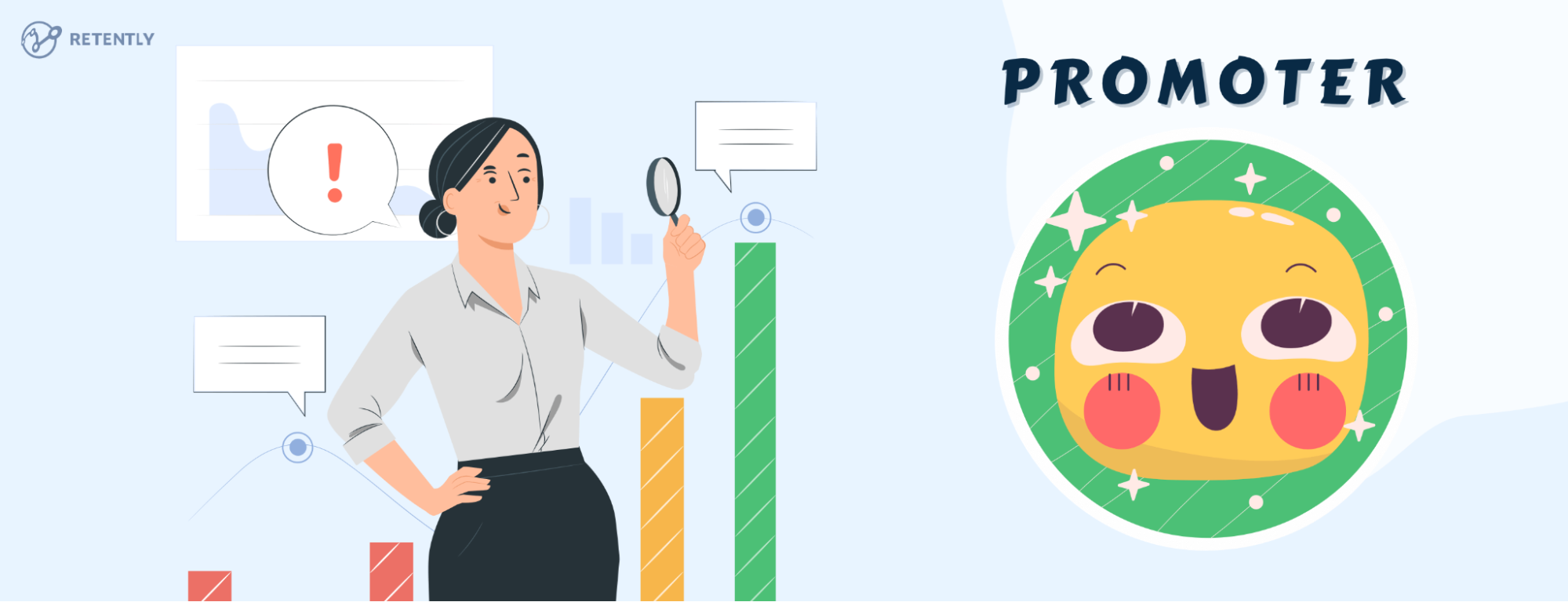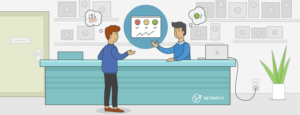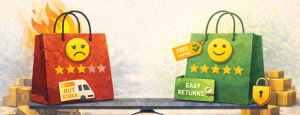According to research by McKinsey & Company, anywhere between 20% to 50% of a company’s revenue thrives on referrals and good old word-of-mouth. In some industries, like SaaS, it may even be as high as 80%.
Yes, you read that right. Somewhere between 20 to 80% of every dime you earn is thanks to customers you’ve made happy – those we fondly call Promoters in the world of NPS® (if you want a quick refresher on what NPS is, check our article).
Imagine your company makes $2 million a year in revenue. Let’s break it down – roughly 35% of that, or $700,000, is driven by word-of-mouth recommendations from your loyal customers. The remaining $1.3 million comes from advertising and direct sales, both of which take a 50% cut into your profit. This leaves you with a net profit of around $650,000. That’s the power of Promoters.
As a decision maker, which of these two channels would you rather use to boost revenue? The answer is obvious.
Here’s the catch most people miss – the customers responsible for driving a significant 35% or more of your revenue represent just a fraction of those willing to recommend you. On average, only 20% of a company’s Promoters will actively endorse their product or service without specific engagement.
Let’s put it in perspective with our earlier example. In simpler terms, if you don’t engage with your Promoters, you could be leaving a staggering $3.5 million on the table.
Now, take a deep breath. Before you dive headfirst into your next NPS campaign, eager to reach out to your Promoters, it’s critical to understand what a Promoter is and how to truly connect with them.
Key Takeaways
- A Promoter’s 9 or 10 is a signal of trust capital, not pure emotion. Customers are saying, “I believe you’ll deliver again”, not just “I enjoyed this once”.
- Promoters buy more often and recommend you for a reason. They trust your reliability, not your promotions. Keep experiences consistent, fast and easy. That’s what actually turns satisfaction into repeat business.
- A big number of Promoters can create blind spots. Brands that stop evolving because “our customers love us” risk losing relevance the moment the market shifts.
- Build systems around Promoters, not simply campaigns. Identify them early, involve them in feedback loops and act on what they tell you. Loyalty has an expiration date if ignored.
- Promoters are your emotional reflection in the market. Every word they use tells you what kind of brand story you’ve written and whether you’re still living up to it.
What Makes an NPS Promoter
Ask most people how to spot and engage a Promoter, and they’ll likely suggest hunting for the customer with the largest social network and asking them to drop a recommendation on Facebook or some other social platform.
Those ideas are not wrong by any means. Yet, online endorsements represent only 7% of all word-of-mouth recommendations. And when it comes to Promoters, it’s not about the size of their network, but rather the message that they’re spreading.
The truth is that Promoters are far more than just an online nod of approval. They’re loyal customers, your faithful advocates, the guardians of your brand, and the ones ready to stake their reputation for your sake.
To really understand what a Promoter is all about, let’s dive into some examples.
Imagine a thriving financial services company, let’s call it Top Finance. Top Finance has consistently impressed its clients with top-notch services, and its customers are more than satisfied. In fact, these customers not only endorse Top Finance on social media but go a step further.
For instance, one satisfied customer, let’s call them Alex, is a proud and loyal customer of Top Finance and has no intention to change ships. They’ve been borderline extraordinary and that’s the formula for advocacy.
By NPS standards, Alex is a Promoter of Top Finance. He’s more than willing to endorse them socially, but that’s only the beginning. Here’s what being a Promoter means in the real world:
Their loyalty runs deep
Take Alex, for example. He most probably received numerous tempting offers from competitors with cheaper rates or enhanced features, yet Alex remains unwavering in his commitment to the brand.
Promoters don’t just recommend you tirelessly but also stick with your brand through thick and thin. They provide stability to your business and are often the first to embrace your expanded offerings, even if it means paying more.
They’re fierce brand defenders
NPS Promoters don’t just sing your praises; they’re your frontline defenders. They can and will disarm any naysayers singlehandedly. Whether it’s entering the fray in a comment section or engaging in a spirited Twitter debate, your Promoters are always ready to champion your cause.
Promoters have a simple yet deep explanation. They understand that when a company consistently delivers a great product backed by an incredible team, there is simply no desire to switch.
They’re committed to your brand’s success
Promoters not only sing your praises but also care about your brand’s improvement. They offer constructive feedback, helping you identify critical areas that need attention. For example, a Promoter who loves a productivity app may proactively suggest features that could make it even better, showing their dedication to your brand’s continuous growth.
They’re willing to go the extra mile
While a social media endorsement is a bold statement, your most dedicated Promoters often take it up a notch.
Consider Sarah, who comes from a family of small business owners. Both her parents have thriving enterprises with strong community reputations. As an entrepreneur herself, Sarah has been cautious about giving advice or endorsing products, fearing potential disappointments that might tarnish her reputation. TechVista was the exception, a product she felt confident enough to wholeheartedly endorse. While Sarah’s endorsement didn’t reach her entire network, it was highly targeted and carried more weight than a mere suggestion to friends. As a result, she directly recommended them to at least five new customers. Have you considered the lifetime value those five customers might bring to your business?
The Impact of Promoters
Promoters, those loyal champions of your brand, bring more than just good vibes. They don’t simply buy your stuff; they bring more customers, spend more money, and spread the word like wildfire. What’s more, customers who receive recommendations from trusted friends or colleagues tend to be easier to convert, have above-average ARPC/LTV, and are inclined to refer others in turn.
Hence, Promoter impact can be a game-changer for your business. Let’s dig into statistics to see how these loyal supporters can transform your company:
1. Improved Customer Conversion and Revenue
When you have Promoters in your corner, you’re not just winning loyal customers; you’re boosting your bottom line. Data and statistics paint a clear picture of the growth driven by Promoters:
- Studies show that customers referred by Promoters are four times more likely to make a purchase compared to those who haven’t received such a recommendation.
- Promoter-referred customers spend 25% more on average per transaction, giving your revenue a significant lift.
- 65% of all new business comes from referrals.
2. Increased Customer Lifetime Value
Promoters aren’t just one-time buyers; they’re here for the long haul. Their loyalty translates to a higher Customer Lifetime Value, making them incredibly valuable assets. Let’s compare the CLV of Promoter-referred customers:
- Promoter-referred customers have a 32% higher CLV compared to non-referred customers.
- They tend to stick around 3-5 years longer, ensuring a steady stream of revenue over time.
- Your investment in nurturing Promoters pays off as their CLV can be up to 25 times higher than their initial purchase.
3. Word-of-Mouth Referrals
Promoters are your brand’s best marketing tool. Their endorsements have a ripple effect that reaches far and wide. Here are some statistics that showcase the effect of Promoter recommendations:
- A single Promoter can influence up to 20 other people to try your product or service.
- Promoter-referred customers are more likely to become Promoters themselves, creating a self-sustaining cycle of advocacy.
- Promoter-driven word-of-mouth referrals generate five times more sales than paid advertising.
The Dark Side of Promoters
Yet, here’s the part most NPS discussions conveniently skip – Promoters can make you overconfident.
When brands start chasing high NPS like it’s a finish line, they often stop doing the very things that earned those scores in the first place. A wall of glowing feedback can feel like proof that you’ve made it, but that comfort is dangerous. Because the moment you treat loyalty as guaranteed, you stop earning it.
We’ve seen this story before. Think of BlackBerry. For years, it had some of the most loyal customers – business users who swore they’d never type on anything but a physical keyboard. The company’s numbers were sky-high. And then came the iPhone. Within a few years, those diehard Promoters vanished, not because they stopped liking BlackBerry, but because the world around them changed faster than the brand did.
Or take Blockbuster – a brand so beloved it was part of weekend culture. Their Promoters weren’t just satisfied customers; they were nostalgic fans. But loyalty couldn’t save them when Netflix rewrote the rules of convenience.
That’s the dark side of having many Promoters. They can lull you into believing that love equals longevity. It doesn’t. Loyalty doesn’t make you immune to disruption; it just gives you a grace period to adapt.
Promoters can make you overconfident, unless you treat their trust as a loan, not a trophy. They’ve invested belief in your brand. Your job is to keep earning interest on that trust, day after day.
The Making of a Modern Promoter
Modern consumers don’t just buy things; they bet part of their identity on brands. They look for values that align with their own: sustainability, fairness, transparency and ethical conduct. They want to feel good about who they’re supporting.
For example, a brand that shares its carbon footprint, sources responsibly, or stands for social justice gives Promoters something more than a good deal; it gives them belonging.
In fact, research shows that while brands often lead with rational incentives, emotional factors become the primary driver of advocacy as relationships mature. And in that same vein, consumers now expect brands to act like two-way relationships – not broadcasting, but listening, adapting and evolving.
Advocacy Happens in Moments, Not Memberships
Gone are the days when loyalty meant a card in your wallet or points stacking up. The real power lies in micro-gestures of delight – a surprise upgrade, a quick apology when service lags, a thoughtful follow-up message. These moments accumulate. They don’t need to be grand, but they do need to feel intentional. Over time, they signal to the customer: “You matter.”
McKinsey calls this “moments of delight”, showing that these small emotional peaks can compound into long-term loyalty and higher revenue performance.
Digital Trust Is the New Currency
Nowadays, Promoters promote not just because they like your product but because they trust how you handle them. Data, privacy and authenticity matter more than ever.
Customers will champion brands that:
- Use their data respectfully
- Demonstrate transparency about algorithms or personalizations
- Own up to mistakes when privacy or service fails
Promoters become your strongest ambassadors when they feel safe and respected, not just satisfied.
Emotional Loyalty Wins
- Deloitte’s research reveals that while consumers first engage on rational terms (price, product, features), emotional engagement is what keeps them loyal and makes them Promoters.
- A McKinsey report also showed that top loyalty programs, which blend meaningful value and emotional connection, can boost revenue from participating customers by 15-25% annually.
- And across consumer surveys, the share of true loyalty (emotional, values-based) has risen, suggesting that brands that rely on transactional tricks are losing ground.
Modern Promoters demand more than consistency or convenience. They demand alignment, respect and emotional safety. If your brand isn’t built to meet those deeper needs, the loyalty you think you have may be built on shifting sands.
The “Trust Loop”: How Promoters Multiply Growth
Here’s when advocacy stops being a happy accident and starts becoming a system.
Because Promoters don’t appear out of nowhere, they thrive when you build structures that recognize, involve, and reinforce their trust. Think of it as a loop, not a line, a living cycle that turns great experiences into growth momentum:
1. Recognition → “We See You”
Start with acknowledgement. Promoters love being seen and appreciated, not as leads, but as partners. A simple shoutout, early access, or a personal thank-you goes a long way. Recognition turns satisfaction into pride, and pride fuels advocacy.
2. Co-Creation → “You’re Part of This”
Once you know who your Promoters are, invite them in, ask for feedback, and involve them in beta tests or pilot programs. Let them help shape what’s next.
In SaaS, brands that invite Promoters to test early versions or co-create new features often see higher retention and lower churn, not just because the product improves, but because those users feel ownership. Co-creation transforms the relationship from consumer to contributor.
3. Amplification → “Tell Your Story”
Now that Promoters feel invested, give them a platform. Share their testimonials, feature their quotes, showcase their use cases. When they see their stories celebrated, their advocacy amplifies naturally.
This stage does not refer to incentivizing reviews, but empowering authenticity. The more real and personal the story, the more it resonates.
4. Reinforcement → “You Keep Delivering”
The loop closes when the brand keeps living up to the trust it’s earned. Deliver consistent experiences, close the feedback loop with updates and keep listening. Every time you prove reliability, you refresh belief.
That’s what makes Promoters stick – not rewards or gimmicks, but the steady rhythm of trust delivered and trust returned.
Therefore, advocacy is a relationship loop, not a reaction. Every recognition sparks belonging. Every collaboration deepens loyalty. Every renewed moment of trust keeps the loop turning.
Conclusion
Customer loyalty is a rare gem and NPS Promoters are your most valuable assets. Cherish them, engage with them, and listen to their feedback. They are the driving force behind your success, and understanding their anatomy is key to unlocking sustained growth. Never underestimate the value of your Promoters; you might be the sole company they openly support, and they’re putting their reputation on the line just for you.
Promoters aren’t here to flatter you. They’re here to hold up a mirror. They show you what’s working, what’s meaningful, and what deserves protection. But that reflection only stays clear if you keep earning it with consistency, empathy and the courage to keep evolving.
Sign up for a free trial and explore Retently to pinpoint your most devoted customers, spot common traits, and harness their potential to boost your business.
Your Promoters already see the best version of your brand. Are you still living up to it?


































 Greg Raileanu
Greg Raileanu 


 Alex Bitca
Alex Bitca 
 Christina Sol
Christina Sol 
